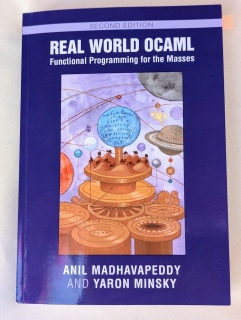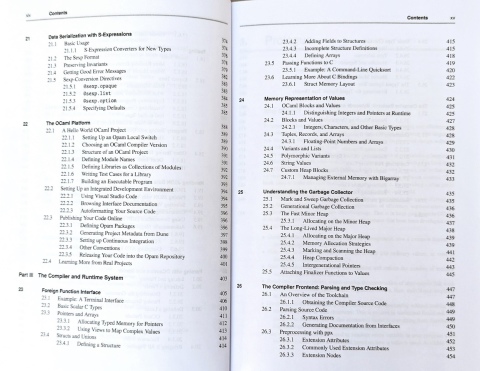Машина Тьюринга на OCaml
2025-06-03 19:47В качестве иллюстрации к языку OCaml вот вам реализация машины Тьюринга. В студенчестве я на Рефале такое писал. Жаль не сохранилось.
Вышеприведённая программа на машине Тьюринга складывает два числа 2+3, записанные как последовательность единиц: 11 111. В результате получается 5, то есть 11111. Запускаем:(* Types for Turing machine *)
type symbol = One | Blank
type direction = Left | Right
type state = string
type transition = (state * symbol) * (state * symbol * direction)
type tape = { left: symbol list; head: symbol; right: symbol list }
(* Convert symbol to string for printing *)
let string_of_symbol = function
| One -> "1"
| Blank -> "_"
(* Print the current tape and head position *)
let print_tape tape state =
let left_str = List.map string_of_symbol tape.left |> String.concat "" in
let right_str = List.map string_of_symbol tape.right |> String.concat "" in
Printf.printf "[%s] %s (%s) %s\n" left_str (string_of_symbol tape.head) state right_str
(* Move the tape head *)
let move_head tape dir =
match dir with
| Right ->
let new_right, new_head = match tape.right with
| [] -> ([], Blank)
| h :: t -> (t, h)
in
{ left = tape.head :: tape.left; head = new_head; right = new_right }
| Left ->
let new_left, new_head = match tape.left with
| [] -> ([], Blank)
| h :: t -> (t, h)
in
{ left = new_left; head = new_head; right = tape.head :: tape.right }
(* Step the Turing machine *)
let step tape state transitions =
let current = (state, tape.head) in
match List.assoc_opt current transitions with
| None -> None (* No transition: halt *)
| Some (new_state, new_symbol, dir) ->
let new_tape = { tape with head = new_symbol } in
let moved_tape = move_head new_tape dir in
Some (moved_tape, new_state)
(* Run the Turing machine *)
let run_turing_machine tape start_state transitions accept_state reject_state =
let rec run tape state =
print_tape tape state;
if state = accept_state then Printf.printf "Accepted\n"
else if state = reject_state then Printf.printf "Rejected\n"
else match step tape state transitions with
| None -> Printf.printf "Halted (no transition)\n"
| Some (new_tape, new_state) -> run new_tape new_state
in
run tape start_state
(* Turing machine to add two unary numbers *)
let example_add () =
let transitions = [
(* q0: Move right to find blank *)
(("q0", One), ("q0", One, Right));
(("q0", Blank), ("q1", One, Left));
(* q1: Move left to start *)
(("q1", One), ("q1", One, Left));
(("q1", Blank), ("qaccept", Blank, Right));
] in
(* Tape represents 2 + 3: 11_111 *)
let tape = { left = []; head = One; right = [One; Blank; One; One; One] } in
run_turing_machine tape "q0" transitions "qaccept" "qreject"
(* Run the example *)
let () = example_add ()
$ ocaml turing_add.ml
[] 1 (q0) 1_111
[1] 1 (q0) _111
[11] _ (q0) 111
[1] 1 (q1) 1111
[] 1 (q1) 11111
[] _ (q1) 111111
[_] 1 (qaccept) 11111
Accepted


